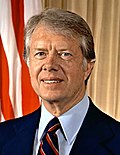This article has multiple issues. Please help improve it or discuss these issues on the talk page . (Learn how and when to remove these messages)
|
| Jimmy Carter | |
|---|---|
| Genre | Documentary |
| Written by | Adriana Bosch [1] |
| Directed by | Adriana Bosch |
| Narrated by | Linda Hunt [1] |
| Music by | Mason Daring [1] |
| Country of origin | United States |
| Original language | English |
| Production | |
| Producer | Adriana Bosch [1] |
| Cinematography | |
| Editor | James Rutenbeck [1] |
| Running time | 180 minutes [2] |
| Original release | |
| Network | PBS |
| Release | November 11, 2002 |
Jimmy Carter is a 2002 two-part television documentary film about Jimmy Carter, the 39th President of the United States. Produced by PBS for the American Experience documentary program, it recounts Carter's life from childhood in Georgia to his post-presidency as peacemaker. [3] The film was written, produced, and directed by Adriana Bosch, and was first aired on PBS in two parts on November 11 and 12, 2002.

